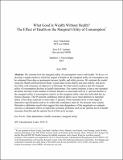| dc.contributor.author | Finkelstein, Amy | |
| dc.contributor.author | Luttmer, Erzo F. P. | |
| dc.contributor.author | Notowidigdo, Matthew J. | |
| dc.date.accessioned | 2013-12-06T17:41:59Z | |
| dc.date.available | 2013-12-06T17:41:59Z | |
| dc.date.issued | 2013-01 | |
| dc.identifier.issn | 15424766 | |
| dc.identifier.issn | 1542-4774 | |
| dc.identifier.uri | http://hdl.handle.net/1721.1/82667 | |
| dc.description.abstract | We estimate how the marginal utility of consumption varies with health. To do so, we develop a simple model in which the impact of health on the marginal utility of consumption can be estimated from data on permanent income, health, and utility proxies. We estimate the model using the Health and Retirement Study's panel data on the elderly and near-elderly, and proxy for utility with measures of subjective well-being. Across a wide range of alternative specifications and assumptions, we find that the marginal utility of consumption declines as health deteriorates, and we are able to clearly reject the null of no state dependence. Our point estimates indicate that a one-standard-deviation increase in the number of chronic diseases is associated with a 10%–25% decline in the marginal utility of consumption relative to this marginal utility when the individual has no chronic diseases. We present some simple, illustrative calibration results that suggest that state dependence of the magnitude we estimate can have a substantial effect on important economic problems such as the optimal level of health insurance benefits and the optimal level of life-cycle savings. | en_US |
| dc.description.sponsorship | United States. Social Security Administration (National Bureau of Economic Research Grant 10-P-98363-1-05) | en_US |
| dc.description.sponsorship | National Institute on Aging (Grant T32-AG000186) | en_US |
| dc.language.iso | en_US | |
| dc.publisher | Wiley Blackwell | en_US |
| dc.relation.isversionof | http://dx.doi.org/10.1111/j.1542-4774.2012.01101.x | en_US |
| dc.rights | Creative Commons Attribution-Noncommercial-Share Alike 3.0 | en_US |
| dc.rights.uri | http://creativecommons.org/licenses/by-nc-sa/3.0/ | en_US |
| dc.source | NBER | en_US |
| dc.title | WHAT GOOD IS WEALTH WITHOUT HEALTH? THE EFFECT OF HEALTH ON THE MARGINAL UTILITY OF CONSUMPTION | en_US |
| dc.type | Article | en_US |
| dc.identifier.citation | Finkelstein, Amy, Erzo F. P. Luttmer, and Matthew J. Notowidigdo. “WHAT GOOD IS WEALTH WITHOUT HEALTH? THE EFFECT OF HEALTH ON THE MARGINAL UTILITY OF CONSUMPTION.” Journal of the European Economic Association 11 (January 3, 2013): 221-258. | en_US |
| dc.contributor.department | Massachusetts Institute of Technology. Department of Economics | en_US |
| dc.contributor.mitauthor | Finkelstein, Amy | en_US |
| dc.relation.journal | Journal of the European Economic Association | en_US |
| dc.eprint.version | Author's final manuscript | en_US |
| dc.type.uri | http://purl.org/eprint/type/JournalArticle | en_US |
| eprint.status | http://purl.org/eprint/status/PeerReviewed | en_US |
| dspace.orderedauthors | Finkelstein, Amy; Luttmer, Erzo F. P.; Notowidigdo, Matthew J. | en_US |
| dc.identifier.orcid | https://orcid.org/0000-0002-9941-6684 | |
| mit.license | OPEN_ACCESS_POLICY | en_US |
| mit.metadata.status | Complete | |
